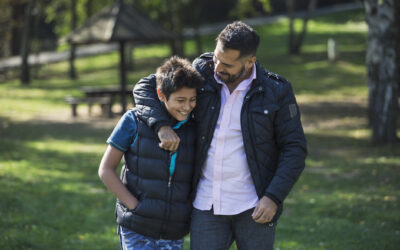How shifting our way of thinking and speaking about our technology consumption can help empower our kids and teens to make smart choices
by Amir Levine, PhD, LCSW-R
The Parenting Dilemma
Studies have shown that teens spend between 7-9 hours daily online and parents often may have limited and at times no knowledge of how they are spending their time online.
As a parent to a teen and a pre-teen, I have found myself often preoccupied with fear over what their young brains are exposed to and digesting, and struggling with discerning the best path to manage their time online. Stripping it away altogether, while tempting, is not realistic. Tech is here and an important avenue for socialization and information and development. Implementing time limits, access to certain apps and rules around use works to a point, yet is not foolproof nor does it offer enough safeguards.
The Impact
According to a recent public advisory put forth by the United States surgeon general Dr. Vivek Murthy, social media use may result in “profound risk” to young people. At a time when the critical brain structures associated with judgment, impulse control and social engagement are still being formed teens are being exposed to information which is powerful and can alter their brain structures.
The associated dangers include depression, anxiety, loneliness, cyber bullying, exposure to predatory behavior, insomnia, obesity, privacy intrusion and exacerbation of ADHD symptoms. With the introduction of the new era of Artificial Intelligence and its widely accessible ChatGPT platform there is a danger that this technology may have a direct impact on our children’s ability to develop their creativity and intellectual authenticity. As one teen mentioned to me “I’ll just ask ChatGPT to write my paper”.
Teaching Teens to Become Empowered Tech Users
All that being said, technology is here to stay and has been a gift in many ways. It has enhanced our ability to learn, produce, connect and organize our lives in more efficient and productive ways. Our teens’ relationship with technology and social platforms will only intensify in the years to come and it’s vital that we find a way for them to develop a healthy relationship with it rather than control it. In reflecting on my own journey as a parent and that of the parents and teens I work with in my practice, I believe there are three skills needed that can help us help our kids manage their technological life:
1. Reconceptualization of the “relationship” we have with technology.
Often we look at technology as a “tool” or “device” and objectify it. By switching our and our’s kids concept of technology from it being an object that we use, to an entity that we are “engaging with”, via how often we invite it into our lives and the influence it can have in our lives can begin to increase our and our kids awareness of how much choice they can have in how they engage with it. Also, when we start with questions such as, “what type of relationship would you like to have with technology and social media?”, “how much influence do you want it to have in your life?”, or “how much time would you want to spend online?”, “how do you feel inside when you stare at your screen for an hour straight?” as opposed to making a declaration of “you should not spend so much time online”, we provide our kids the opportunity to reflect upon their own experiences, to learn to think differently and feel empowered in making choices about their use and help them learn to be more mindful and aware of how their emotional, psychological and physical self is being impacted by their online use. Cultivating openness to reflecting on their relationship with technology will help increase their mindfulness and sense of judgment in regards to their online use.
2. Empower the development of a safety template.
It’s crucial kids understand the dangers associated with technology and social media use. It’s not surprising that just recently the Presidential Panel of the American Psychological Association advised for the implementation of a social media literacy training program in ensuring teens are aware of the possible dangers of online use. Yet, as parents, when we speak about our “safety” concerns for our kids, it’s not uncommon for them to shut down or tune us out. Speaking about safety without fear and in a manner that is matter of fact and with options for choices of how to enjoy the technology in a safe way can help move this necessary conversation in a more productive manner. Asking our kids how they define safety first is important to gauge where they are at. Then providing a definition of what is unsafe as anything that can hurt you both physically and mentally in how you think about yourself, your body, anything that can cause you to compare yourself negatively to others, anything that makes you feel sad, violates your privacy or feels weird and creepy. Creating a safety template and keeping it accessible via casual conversation is a way to help kids and teens hone their judgment about what they expose themselves to.
3. Teach our teens to be proactive and not reactive users.
If our young tech users have a sense of clarity of their intentions and goals regarding their online use, they can feel more in control of their and be proactive rather than reactive. Helping our teens connect with their values and reasons for engaging with different platforms, talking with them about what they feel like and get out of certain times spent online, certain apps and information they are looking at, asking them what is important to them can help them be more purposeful in their use.
Best Practices Framework for Teens Staying Safe Online
As parents and caregivers, we try our best to monitor, supervise and observe our young technology users. However, relying only on defensive behavior will only reinforce passivity, guardedness and defensiveness in our kids and teens. It’s important to empower our kids and teens to be active collaborators and join in the conversation with us. Empathy, curiosity, non judgment and creating a holding space for exploration of what they are experiencing online is vital when trying to navigate these and many matters. We don’t want to get lost in the role of preacher and teacher, but rather help them reflect on how their technology use is impacting them and others and how to be independent thinkers. Sometimes asking simple questions such as, “what did you see interesting online today? How did you feel about it? What did you like/not like? Did you post anything you would like to share with me? Why did you post it? How did posting or going on a certain online platform help you?” Can go a long way helping our young users become more reflective and aware users.
A wise professor once told me, “my goal is not to teach you what to think but rather how to think”. I can’t think of a more relevant piece of wisdom in this rapidly changing and complex, technologically driven world.
Resources:
American Psychological Association. (May 9, 2023). APA Panel issues recommendations for adolescent social media use (Press release). https://www.apa.org/news/press/releases/2023/05/adolescent-social-media-use-recommendations
Rechtel, M., Pearson, C., & Levenson, M. (May 23, 2023). Surgeon General Warns That Social Media May Harm Children and Adolescents. The New York Times. https://www.nytimes.com/2023/05/23/health/surgeon-general-social-media-mental-health.html



